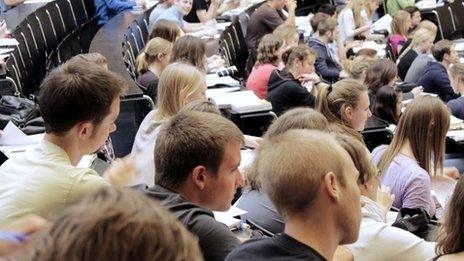Student scholarship fund to be cut by £100m
- Published

The scholarships were launched amid worries about higher tuition fees
A student scholarship programme in England created in response to fears about the impact of higher tuition fees is to have its budget heavily cut.
The government's Spending Review includes plans to cut the National Scholarship Programme from £150m to £50m in 2015-16.
The Department for Business, Innovation and Skills says that the scholarship scheme is not being scrapped.
But funding will be for postgraduate rather than undergraduate students.
The National Union of Students said the decision "effectively cancelled the National Scholarship Programme", which it said would have provided "small bursaries for the poorest undergraduates in higher education".
A Department for Business statement says it will "refocus" the scholarship programme to "support postgraduate students from disadvantaged backgrounds".
Fee protests
This will now be a £50m fund, administered by the Higher Education Funding Council for England.
In the previous year, 2014-15, funding for the scholarships had been set at £150m.
The National Scholarship Programme had been announced by Deputy Prime Minister Nick Clegg in February 2011.
The raising of tuition fees to up to £9,000 had prompted student protests and warnings that poorer students would be excluded from university.
The scholarship scheme had been launched as a response to such fears, with promises that 50,000 students from poorer backgrounds would receive funding.
The scholarship programme offered fee waivers and cash bursaries of up to £1,000 per year.
This month Business Secretary Vince Cable commended the achievements of the programme in its first year of funding students.
Growing concerns
The department says that higher fees have not deterred poorer students, as applications by them have continued to increase.
The switch to support to postgraduate funding reflects growing concerns about students not continuing beyond graduate level.
The 1994 Group of research universities welcomed the shift to postgraduate students saying university leaders had warned of a "looming crisis in postgraduate education".
The UCU lecturers' union said the scholarship programme had been "widely regarded as a sweetener to get Liberal Democrat MPs to back higher tuition fees".
"Put simply, today is another dark day for students under the coalition government," said the union's president, Simon Renton.
A department spokeswoman said: "Our reforms mean responsibility to widen access to higher education for undergraduates has shifted from government to universities, which are now well funded to do this.
"Universities are increasing their investment in widening access by £100m over the next four years, to reach £670m in 2016-17.
"This means the government is able to refocus the National Scholarship Programme on supporting people from less advantaged backgrounds to access postgraduate study, which is where it is most needed."
- Published26 June 2013
- Published26 June 2013
- Published29 September 2011